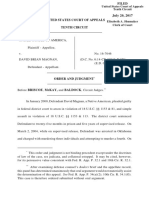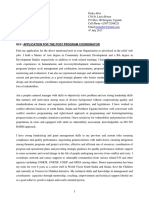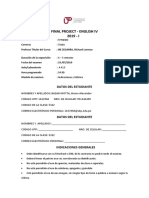United States v. Hohman, C.A.A.F. (2011)
United States v. Hohman, C.A.A.F. (2011)
Uploaded by
Scribd Government DocsCopyright:
Available Formats
United States v. Hohman, C.A.A.F. (2011)
United States v. Hohman, C.A.A.F. (2011)
Uploaded by
Scribd Government DocsOriginal Description:
Copyright
Available Formats
Share this document
Did you find this document useful?
Is this content inappropriate?
Copyright:
Available Formats
United States v. Hohman, C.A.A.F. (2011)
United States v. Hohman, C.A.A.F. (2011)
Uploaded by
Scribd Government DocsCopyright:
Available Formats
UNITED STATES, Appellee
v.
Caleb P. HOHMAN, Sergeant
U.S. Marine Corps, Appellant
No. 11-6004
Crim. App. No. 201000563
United States Court of Appeals for the Armed Forces
Argued May 18, 2011
Decided May 31, 2011
PER CURIAM
Counsel
For Appellant:
(argued).
Lieutenant Michael R. Torrisi, JAGC, USN
For Appellee: Lieutenant Kevin D. Shea, JAGC, USN (argued);
Colonel Louis J. Puleo, USMC, and Brian K. Keller, Esq.
Military Judge:
Thomas J. Sanzi
THIS OPINION IS SUBJECT TO REVISION BEFORE FINAL PUBLICATION.
United States v. Hohman, No. 11-6004/MC
PER CURIAM:
The present case involves a government appeal of an
interlocutory ruling by the military judge abating the
proceedings in the court-martial of Sergeant Caleb P. Hohman.
See Article 62, Uniform Code of Military Justice (UCMJ), 10
U.S.C. 862 (2006).
The pending charges include violation of a
lawful general order, dereliction of duty, and involuntary
manslaughter in violation of Articles 92 and 119, UCMJ, 10
U.S.C. 892, 919 (2006).
The primary issue on appeal concerns
the status of Captain (Capt) Robert F. Muth, United States
Marine Corps Reserve, as detailed military defense counsel under
Articles 27 and 38(b)(3)(A), UCMJ, 10 U.S.C. 827,
838(b)(3)(A)(2006).1
I.
On March 19, 2008, the convening authority referred charges
against Appellant for trial by general court-martial.
Throughout the ensuing proceedings, Mr. Joseph Low has
represented Appellant as civilian defense counsel.
After a
series of detailed defense counsel had been detailed to the case
and released by Appellant, the Marine Corps assigned Capt Muth
See 70 M.J. 37 (C.A.A.F. 2011) (order granting petition for
review).
2
United States v. Hohman, No. 11-6004/MC
on April 17, 2009, to serve as Appellants detailed military
defense counsel.
Capt Muth, who faced separation from active duty on October
1, 2009, submitted two administrative requests for extension of
active duty in order to continue his representation of
Appellant.
The administrative authorities granted an extension
until December 1, 2009, but denied any further extension.
Muth left active duty on December 1, 2009.
Capt
Two days later, on
December 3, the Marine Corps assigned Capt L. T. Kunce to serve
as detailed military defense counsel.
Prior to his December 1, 2009, departure from active duty
and from his duties as detailed military defense counsel:
(1)
Capt Muth did not seek the permission of the military judge to
withdraw from representation in the ongoing trial as required by
the applicable rules, see Dept of the Navy, Judge Advocate
General Instr. 5803.1.C, para. 16e(2) (Nov. 4, 2004); (2) the
defense team did not bring to the attention of the military
judge the details of Capt Muths request to remain on active
duty or the actions taken by administrative authorities in
response to that request; and (3) the defense team did not move
for relief in the form of a motion requesting that Capt Muth
remain a part of the defense team.2
The record reflects that on November 16, 2009, prior to the
termination of Capt Muths active service, the military judge
3
United States v. Hohman, No. 11-6004/MC
On September 15, 2010, over nine months after Capt Muths
termination of active service, the military judge concluded that
the Marine Corps erroneously had severed the attorney-client
relationship without good cause, and that the appropriate remedy
required abatement of the proceedings pending restoration of
Capt Muth as detailed defense counsel.
The Government filed an
interlocutory appeal, and the United States Navy-Marine Corps
Court of Criminal Appeals set aside the abatement order.
No.
NMCCA 201000563, 2011 CCA LEXIS 14, at *10, 2011 WL 311041, at
*4 (N-M. Ct. Crim. App. Jan. 31, 2011) (unpublished).
The
defense has asked this Court to reverse the decision of the
court below.
II.
The military judge erred in this case by not taking
appropriate action to address this matter prior to Capt Muths
departure from active duty on December 1, 2009.
The Rules for
indicated that he was aware of Capt Muths impending departure
from active duty. The military judge stated that he wished to
discuss the matter with Appellant, but civilian defense counsel
interjected, requesting more time to discuss the matter with the
accused. The military judge granted this request and stated
that he would revisit the issue at a later hearing. The
military judge, however, did not revisit the issue prior to the
departure of Capt Muth from active duty on December 1, 2009, and
his replacement by Capt Kunce on December 3, 2009. There was no
further discussion on the record regarding Capt Muths departure
until April 6, 2010, four months after his departure from active
service.
United States v. Hohman, No. 11-6004/MC
Courts-Martial (R.C.M.) provide specific options for severance
of the attorney-client relationship under R.C.M. 505(d)(2)(B)
and 506(c).
United States v. Hutchins, 69 M.J. 282, 289
(C.A.A.F. 2011).
Among those options, defense counsel may be
excused by the military judge upon application for withdrawal
by the defense counsel for good cause shown.
(quoting R.C.M. 506(c)).
Id. at 290
Where the parties have indicated that
a defense member has been excused under R.C.M. 505(d)(2)(B),
the military judge must ensure under R.C.M. 813(c) that:
(1)
the record demonstrates that a competent detailing authority has
determined that good cause exists for excusing counsel; and (2)
that the record sets forth the basis for the good cause
determination.
Id. at 291.
In the present case, the military
judge failed to place any of the approved reasons for severing
the attorney-client relationship on the record prior to the
departure of Capt Muth from active duty.
for prejudice.
We test such an error
Id. at 292.
We clarified in Hutchins that [a]lthough separation from
active duty normally terminates representation, highly
contextual circumstances may warrant an exception from this
general guidance in a particular case.
Id. at 290-91.
In this
case, Appellant has not demonstrated any circumstances that
would warrant an exception from the general guidance.
Moreover,
under the specific circumstances of this case, including the
United States v. Hohman, No. 11-6004/MC
responsibilities of Capt Muth in relation to the defense team,
Appellant has not established that the assignment of Capt Kunce
as detailed military defense counsel on December 3, 2009, was
insufficient to remedy the procedural error in the severance of
Capt Muths status as detailed military defense counsel on
December 1, 2009.
Accordingly, the judgment of the United States Navy-Marine
Corps Court of Criminal Appeals is affirmed.
The case is
remanded to the Judge Advocate General of the Navy who shall
return the case to the military judge for further proceedings
consistent with this opinion.
You might also like
- 01 Service Manual SV600 V4.0 enDocument384 pages01 Service Manual SV600 V4.0 enLuis Felipe Romero100% (4)
- Chihuahua Dog Amigurumi Crochet Pattern v3 LittlemeecreationsDocument5 pagesChihuahua Dog Amigurumi Crochet Pattern v3 LittlemeecreationsJuan Carlos Alonso100% (6)
- Savings Summary: We'Re Updating Our AtmsDocument2 pagesSavings Summary: We'Re Updating Our AtmsPavel Kolesnik33% (3)
- Eicas Messages - Failures - B767 Passenger and Freighters Airplanes - (Only Reference)Document31 pagesEicas Messages - Failures - B767 Passenger and Freighters Airplanes - (Only Reference)Daniel Ospina100% (2)
- Publish United States Court of Appeals For The Tenth CircuitDocument10 pagesPublish United States Court of Appeals For The Tenth CircuitScribd Government Docs100% (1)
- United States v. McNutt, C.A.A.F. (2005)Document38 pagesUnited States v. McNutt, C.A.A.F. (2005)Scribd Government DocsNo ratings yet
- United States v. Stoffer, C.A.A.F. (2000)Document5 pagesUnited States v. Stoffer, C.A.A.F. (2000)Scribd Government DocsNo ratings yet
- United States v. Tate, C.A.A.F. (2007)Document11 pagesUnited States v. Tate, C.A.A.F. (2007)Scribd Government DocsNo ratings yet
- United States v. Tittel, C.A.A.F. (2016)Document4 pagesUnited States v. Tittel, C.A.A.F. (2016)Scribd Government DocsNo ratings yet
- United States v. Hutchins, C.A.A.F. (2011)Document32 pagesUnited States v. Hutchins, C.A.A.F. (2011)Scribd Government DocsNo ratings yet
- United States v. Doty, C.A.A.F. (1999)Document5 pagesUnited States v. Doty, C.A.A.F. (1999)Scribd Government DocsNo ratings yet
- Timothy Hennis v. Frank Hemlick, 4th Cir. (2012)Document19 pagesTimothy Hennis v. Frank Hemlick, 4th Cir. (2012)Scribd Government DocsNo ratings yet
- United States Air Force Court of Criminal AppealsDocument8 pagesUnited States Air Force Court of Criminal AppealsScribd Government DocsNo ratings yet
- United States v. Ortiz, C.A.A.F. (2017)Document8 pagesUnited States v. Ortiz, C.A.A.F. (2017)Scribd Government DocsNo ratings yet
- United States v. Williams, C.A.A.F. (2001)Document15 pagesUnited States v. Williams, C.A.A.F. (2001)Scribd Government DocsNo ratings yet
- United States v. Becker, C.A.A.F. (2000)Document7 pagesUnited States v. Becker, C.A.A.F. (2000)Scribd Government DocsNo ratings yet
- This Opinion Is Subject To Revision Before Final PublicationDocument20 pagesThis Opinion Is Subject To Revision Before Final PublicationScribd Government DocsNo ratings yet
- This Opinion Is Subject To Revision Before Final PublicationDocument23 pagesThis Opinion Is Subject To Revision Before Final PublicationScribd Government DocsNo ratings yet
- United States v. Cooper, C.A.A.F. (2003)Document22 pagesUnited States v. Cooper, C.A.A.F. (2003)Scribd Government DocsNo ratings yet
- Noyd v. Bond, 395 U.S. 683 (1969)Document12 pagesNoyd v. Bond, 395 U.S. 683 (1969)Scribd Government DocsNo ratings yet
- KSM Ii (Ae425 (KSM) )Document33 pagesKSM Ii (Ae425 (KSM) )spencerackerman7502No ratings yet
- United States v. Serianne, C.A.A.F. (2010)Document10 pagesUnited States v. Serianne, C.A.A.F. (2010)Scribd Government DocsNo ratings yet
- United States v. Nelson, C.A.A.F. (1999)Document4 pagesUnited States v. Nelson, C.A.A.F. (1999)Scribd Government DocsNo ratings yet
- United States v. Dean, C.A.A.F. (2009)Document24 pagesUnited States v. Dean, C.A.A.F. (2009)Scribd Government DocsNo ratings yet
- United States v. Hutchison, C.A.A.F. (2002)Document12 pagesUnited States v. Hutchison, C.A.A.F. (2002)Scribd Government DocsNo ratings yet
- United States v. Bradley, C.A.A.F. (2010)Document26 pagesUnited States v. Bradley, C.A.A.F. (2010)Scribd Government DocsNo ratings yet
- NMCCA 2011 OpinionDocument5 pagesNMCCA 2011 OpinionEhlers AngelaNo ratings yet
- United States v. Zolnosky, A.F.C.C.A. (2014)Document6 pagesUnited States v. Zolnosky, A.F.C.C.A. (2014)Scribd Government DocsNo ratings yet
- This Opinion Is Subject To Revision Before Final PublicationDocument10 pagesThis Opinion Is Subject To Revision Before Final PublicationScribd Government DocsNo ratings yet
- United States v. Tardif, C.A.A.F. (2002)Document31 pagesUnited States v. Tardif, C.A.A.F. (2002)Scribd Government DocsNo ratings yet
- This Opinion Is Subject To Revision Before Final PublicationDocument6 pagesThis Opinion Is Subject To Revision Before Final PublicationScribd Government DocsNo ratings yet
- Lehmann v. Acheson, Secretary of State of United States, 214 F.2d 403, 3rd Cir. (1954)Document5 pagesLehmann v. Acheson, Secretary of State of United States, 214 F.2d 403, 3rd Cir. (1954)Scribd Government DocsNo ratings yet
- United States v. Morton, C.A.A.F. (2010)Document12 pagesUnited States v. Morton, C.A.A.F. (2010)Scribd Government DocsNo ratings yet
- Sherrill v. Commandant, USDB, 10th Cir. (2004)Document5 pagesSherrill v. Commandant, USDB, 10th Cir. (2004)Scribd Government DocsNo ratings yet
- United States Air Force Court of Criminal AppealsDocument3 pagesUnited States Air Force Court of Criminal AppealsScribd Government DocsNo ratings yet
- United States Air Force Court of Criminal AppealsDocument8 pagesUnited States Air Force Court of Criminal AppealsScribd Government DocsNo ratings yet
- United States v. Stringer, C.A.A.F. (2001)Document6 pagesUnited States v. Stringer, C.A.A.F. (2001)Scribd Government DocsNo ratings yet
- United States v. Hutchins, C.A.A.F. (2013)Document67 pagesUnited States v. Hutchins, C.A.A.F. (2013)Scribd Government DocsNo ratings yet
- United States v. Quintanilla, C.A.A.F. (2001)Document136 pagesUnited States v. Quintanilla, C.A.A.F. (2001)Scribd Government DocsNo ratings yet
- Jones v. United States, 10th Cir. (2009)Document12 pagesJones v. United States, 10th Cir. (2009)Scribd Government DocsNo ratings yet
- United States v. Chapa, C.A.A.F. (2002)Document23 pagesUnited States v. Chapa, C.A.A.F. (2002)Scribd Government DocsNo ratings yet
- Butler - 39802 U 338839Document69 pagesButler - 39802 U 338839davidthefisher249No ratings yet
- United States Air Force Court of Criminal AppealsDocument12 pagesUnited States Air Force Court of Criminal AppealsScribd Government DocsNo ratings yet
- United States Air Force Court of Criminal AppealsDocument15 pagesUnited States Air Force Court of Criminal AppealsScribd Government DocsNo ratings yet
- United States v. Brevard, C.A.A.F. (2003)Document11 pagesUnited States v. Brevard, C.A.A.F. (2003)Scribd Government DocsNo ratings yet
- United States v. Hurn, C.A.A.F. (2003)Document6 pagesUnited States v. Hurn, C.A.A.F. (2003)Scribd Government DocsNo ratings yet
- His Opinion Is Subject To Editorial Correction Before PublicationDocument9 pagesHis Opinion Is Subject To Editorial Correction Before PublicationScribd Government DocsNo ratings yet
- United States v. Rush, C.A.A.F. (2001)Document13 pagesUnited States v. Rush, C.A.A.F. (2001)Scribd Government DocsNo ratings yet
- United States v. Latham, A.F.C.C.A. (2014)Document7 pagesUnited States v. Latham, A.F.C.C.A. (2014)Scribd Government DocsNo ratings yet
- United States v. Stefan, C.A.A.F. (2010)Document9 pagesUnited States v. Stefan, C.A.A.F. (2010)Scribd Government DocsNo ratings yet
- United States Air Force Court of Criminal AppealsDocument10 pagesUnited States Air Force Court of Criminal AppealsScribd Government DocsNo ratings yet
- Mark P. Chilcott v. Verne Orr, Secretary of The United States Air Force, 747 F.2d 29, 1st Cir. (1984)Document7 pagesMark P. Chilcott v. Verne Orr, Secretary of The United States Air Force, 747 F.2d 29, 1st Cir. (1984)Scribd Government DocsNo ratings yet
- This Opinion Is Subject To Revision Before Final PublicationDocument33 pagesThis Opinion Is Subject To Revision Before Final PublicationScribd Government DocsNo ratings yet
- United States v. Wade, A.F.C.C.A. (2014)Document14 pagesUnited States v. Wade, A.F.C.C.A. (2014)Scribd Government DocsNo ratings yet
- United States v. Clemente, C.A.A.F. (1999)Document4 pagesUnited States v. Clemente, C.A.A.F. (1999)Scribd Government DocsNo ratings yet
- HamdanDocument137 pagesHamdanjohnsmith37788No ratings yet
- United States v. McFadyen, C.A.A.F. (1999)Document5 pagesUnited States v. McFadyen, C.A.A.F. (1999)Scribd Government DocsNo ratings yet
- United States of America Ex Rel. Neil Bruce Checkman v. Hon. Melvin Laird, Secretary of Defense, 469 F.2d 773, 2d Cir. (1972)Document21 pagesUnited States of America Ex Rel. Neil Bruce Checkman v. Hon. Melvin Laird, Secretary of Defense, 469 F.2d 773, 2d Cir. (1972)Scribd Government DocsNo ratings yet
- United States v. Glover, C.A.A.F. (2000)Document5 pagesUnited States v. Glover, C.A.A.F. (2000)Scribd Government DocsNo ratings yet
- United States Air Force Court of Criminal AppealsDocument4 pagesUnited States Air Force Court of Criminal AppealsScribd Government DocsNo ratings yet
- United States v. Burt, C.A.A.F. (2016)Document11 pagesUnited States v. Burt, C.A.A.F. (2016)Scribd Government DocsNo ratings yet
- Hanson v. Wyatt, 540 F.3d 1187, 10th Cir. (2008)Document56 pagesHanson v. Wyatt, 540 F.3d 1187, 10th Cir. (2008)Scribd Government DocsNo ratings yet
- This Opinion Is Subject To Revision Before PublicationDocument25 pagesThis Opinion Is Subject To Revision Before PublicationScribd Government DocsNo ratings yet
- United States v. Lee, C.A.A.F. (2014)Document14 pagesUnited States v. Lee, C.A.A.F. (2014)Scribd Government DocsNo ratings yet
- The American Challenge: Terrorists, Detainees, Treaties, and Torture-Responses to the Rule of Law, 2001-2008From EverandThe American Challenge: Terrorists, Detainees, Treaties, and Torture-Responses to the Rule of Law, 2001-2008No ratings yet
- United States v. Garcia-Damian, 10th Cir. (2017)Document9 pagesUnited States v. Garcia-Damian, 10th Cir. (2017)Scribd Government Docs100% (1)
- Payn v. Kelley, 10th Cir. (2017)Document8 pagesPayn v. Kelley, 10th Cir. (2017)Scribd Government Docs50% (2)
- United States v. Olden, 10th Cir. (2017)Document4 pagesUnited States v. Olden, 10th Cir. (2017)Scribd Government DocsNo ratings yet
- Greene v. Tennessee Board, 10th Cir. (2017)Document2 pagesGreene v. Tennessee Board, 10th Cir. (2017)Scribd Government DocsNo ratings yet
- Consolidation Coal Company v. OWCP, 10th Cir. (2017)Document22 pagesConsolidation Coal Company v. OWCP, 10th Cir. (2017)Scribd Government DocsNo ratings yet
- United States v. Kieffer, 10th Cir. (2017)Document20 pagesUnited States v. Kieffer, 10th Cir. (2017)Scribd Government DocsNo ratings yet
- City of Albuquerque v. Soto Enterprises, 10th Cir. (2017)Document21 pagesCity of Albuquerque v. Soto Enterprises, 10th Cir. (2017)Scribd Government DocsNo ratings yet
- Coyle v. Jackson, 10th Cir. (2017)Document7 pagesCoyle v. Jackson, 10th Cir. (2017)Scribd Government Docs100% (1)
- Apodaca v. Raemisch, 10th Cir. (2017)Document15 pagesApodaca v. Raemisch, 10th Cir. (2017)Scribd Government DocsNo ratings yet
- Brown v. Shoe, 10th Cir. (2017)Document6 pagesBrown v. Shoe, 10th Cir. (2017)Scribd Government DocsNo ratings yet
- Publish United States Court of Appeals For The Tenth CircuitDocument24 pagesPublish United States Court of Appeals For The Tenth CircuitScribd Government DocsNo ratings yet
- Harte v. Board Comm'rs Cnty of Johnson, 10th Cir. (2017)Document100 pagesHarte v. Board Comm'rs Cnty of Johnson, 10th Cir. (2017)Scribd Government DocsNo ratings yet
- United States v. Roberson, 10th Cir. (2017)Document50 pagesUnited States v. Roberson, 10th Cir. (2017)Scribd Government DocsNo ratings yet
- Pecha v. Lake, 10th Cir. (2017)Document25 pagesPecha v. Lake, 10th Cir. (2017)Scribd Government DocsNo ratings yet
- Publish United States Court of Appeals For The Tenth CircuitDocument14 pagesPublish United States Court of Appeals For The Tenth CircuitScribd Government Docs100% (1)
- Coburn v. Wilkinson, 10th Cir. (2017)Document9 pagesCoburn v. Wilkinson, 10th Cir. (2017)Scribd Government DocsNo ratings yet
- United States v. Voog, 10th Cir. (2017)Document5 pagesUnited States v. Voog, 10th Cir. (2017)Scribd Government DocsNo ratings yet
- United States v. Muhtorov, 10th Cir. (2017)Document15 pagesUnited States v. Muhtorov, 10th Cir. (2017)Scribd Government DocsNo ratings yet
- NM Off-Hwy Vehicle Alliance v. U.S. Forest Service, 10th Cir. (2017)Document9 pagesNM Off-Hwy Vehicle Alliance v. U.S. Forest Service, 10th Cir. (2017)Scribd Government DocsNo ratings yet
- United States v. Henderson, 10th Cir. (2017)Document2 pagesUnited States v. Henderson, 10th Cir. (2017)Scribd Government DocsNo ratings yet
- Publish United States Court of Appeals For The Tenth CircuitDocument17 pagesPublish United States Court of Appeals For The Tenth CircuitScribd Government DocsNo ratings yet
- United States v. Magnan, 10th Cir. (2017)Document27 pagesUnited States v. Magnan, 10th Cir. (2017)Scribd Government DocsNo ratings yet
- United States v. Kearn, 10th Cir. (2017)Document25 pagesUnited States v. Kearn, 10th Cir. (2017)Scribd Government DocsNo ratings yet
- United States v. Windom, 10th Cir. (2017)Document25 pagesUnited States v. Windom, 10th Cir. (2017)Scribd Government DocsNo ratings yet
- Pledger v. Russell, 10th Cir. (2017)Document5 pagesPledger v. Russell, 10th Cir. (2017)Scribd Government DocsNo ratings yet
- United States v. Magnan, 10th Cir. (2017)Document4 pagesUnited States v. Magnan, 10th Cir. (2017)Scribd Government DocsNo ratings yet
- United States v. Kundo, 10th Cir. (2017)Document7 pagesUnited States v. Kundo, 10th Cir. (2017)Scribd Government DocsNo ratings yet
- Northern New Mexicans v. United States, 10th Cir. (2017)Document10 pagesNorthern New Mexicans v. United States, 10th Cir. (2017)Scribd Government DocsNo ratings yet
- Robles v. United States, 10th Cir. (2017)Document5 pagesRobles v. United States, 10th Cir. (2017)Scribd Government DocsNo ratings yet
- Unit 7 Media Enterprise LaaDocument13 pagesUnit 7 Media Enterprise Laaapi-471521676No ratings yet
- Regulating Act, 1773, Constitutional HistoryDocument3 pagesRegulating Act, 1773, Constitutional HistoryKaran SinghNo ratings yet
- Ashna's Resume-CompressedDocument2 pagesAshna's Resume-CompressedAkhil GirijanNo ratings yet
- Website Notice - RPE July To Sept 2023Document2 pagesWebsite Notice - RPE July To Sept 2023Ask NeNo ratings yet
- DNV Ru Ship Pt.7 Ch.1Document212 pagesDNV Ru Ship Pt.7 Ch.1omkarNo ratings yet
- Draf Cadangan Pindaan TU 2018Document47 pagesDraf Cadangan Pindaan TU 2018Syam YasinNo ratings yet
- M3 R20 - Unit-1Document63 pagesM3 R20 - Unit-1Krishna VenkatNo ratings yet
- Del-Chand Bus TicketDocument2 pagesDel-Chand Bus TicketAnkur GuptaNo ratings yet
- TRB V CADocument9 pagesTRB V CARica AggabaoNo ratings yet
- Cover - Letter - Program CoordinatorDocument2 pagesCover - Letter - Program CoordinatorPaska AberNo ratings yet
- 025 DIGESTED El Pueblo de Filipinas Vs Pablo San Juan y Monterosa - No. L-46896Document4 pages025 DIGESTED El Pueblo de Filipinas Vs Pablo San Juan y Monterosa - No. L-46896Paul ToguayNo ratings yet
- Final Project - English Iv 2019 - I: Datos Del EstudianteDocument2 pagesFinal Project - English Iv 2019 - I: Datos Del EstudianteAndree julio Bazan mottaNo ratings yet
- Marketing Manager With 3 Years of Experience in Marketing-Sales-Corporate CommunicationDocument4 pagesMarketing Manager With 3 Years of Experience in Marketing-Sales-Corporate CommunicationAman RajNo ratings yet
- 0302-2138C ChromNAV InstructionManual 2Document116 pages0302-2138C ChromNAV InstructionManual 2Yoosu NguyenNo ratings yet
- Human Resource Practises in ITCDocument65 pagesHuman Resource Practises in ITCShaikh Saira TabassumNo ratings yet
- Learning in The World Café - An Empirical EvaluationDocument14 pagesLearning in The World Café - An Empirical Evaluationgkrz4f8cjcNo ratings yet
- Quark StoreReceipt PDFDocument1 pageQuark StoreReceipt PDFandrew234edwardNo ratings yet
- S. No. Major Head 1 Minor Head 1Document49 pagesS. No. Major Head 1 Minor Head 1ankit_gadiya24No ratings yet
- Case Study 2Document3 pagesCase Study 2api-388950428No ratings yet
- Module #04 - OperatorsDocument10 pagesModule #04 - OperatorsgyanNo ratings yet
- Development Displacement and Rehabilitation An Action Anthropological Study On Kovvada Reservoir in West Godavari Agency of Andhra Pradesh IndiaDocument7 pagesDevelopment Displacement and Rehabilitation An Action Anthropological Study On Kovvada Reservoir in West Godavari Agency of Andhra Pradesh IndiaHarshit MalviyaNo ratings yet
- DaisyGrannySquareBlanket-Crochet365KnitToo 1710997011605Document31 pagesDaisyGrannySquareBlanket-Crochet365KnitToo 1710997011605pearl ikebuakuNo ratings yet
- Excellence in Business Communication Canadian 5th Edition Thill Solutions ManualDocument22 pagesExcellence in Business Communication Canadian 5th Edition Thill Solutions Manualmagnusorborneshw5100% (22)
- L06Document32 pagesL06Aliya SarunNo ratings yet
- Seajaan Logistics PVTDocument17 pagesSeajaan Logistics PVTAnkur SarkarNo ratings yet
- Small Service CertificateDocument5 pagesSmall Service CertificateSidvik InfotechNo ratings yet























































































































